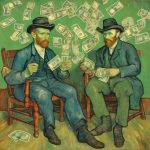Market Psychology Is the Study of the Madness of Crowds
April 4, 2025
Market Psychology isn’t a backdrop—it’s the battlefield. It’s not a factor in trading; it is the engine. Every rally, every crash, every false breakout is a mirror of collective emotion—fear, greed, hope, delusion—spun out by headlines, echo chambers, and algorithmic panic loops. Mastering it isn’t an edge. It’s survival.
⚔️ To command the market, you don’t conquer price—you conquer perception.
True power? Not in the chart. It’s in the minds of those watching it.
The Grip of Market Psychology on Trading Decisions
Herding Behavior: The Cult of the Crowd
When markets run wild, most traders become shadows of each other—copying action, mirroring panic, echoing euphoria.
? Bubbles are not built on data—they’re built on dopamine.
? Crashes don’t begin with fundamentals—they begin with fear contagion.
?✔️ Herding is not just dangerous—it’s structurally designed to destroy the latecomers.
“Never buy because it’s going up. Never sell because it’s going down.”
Because by the time you feel safe, you’re already the exit liquidity.
Fear and Greed: The Twin Tyrants
Fear freezes. Greed blinds. Both lie.
And both are predictable—weaponizable—if you’ve trained yourself to see the cues.
✔️ Fear creates undervaluation. Greed creates overexposure.
“The four most dangerous words in investing: ‘This time it’s different.’”
It never is. History rhymes in screams and whispers. Recognize the cadence.
The Noise Machine: Headlines, Hype, and Hysteria
Markets don’t move on logic—they move on narratives.
One tweet. One misinterpreted data point. One rumor. And the herd panics.
?✔️ The skilled don’t react—they pre-position.
The truth?
If you flinch every time the market gasps, you’re a puppet, not a player.
Outmaneuvering the Madness
Sharpening Awareness: The Inner Edge
You can’t master market psychology without mastering your own.
It’s not about resisting emotion. It’s about seeing it, isolating it, and neutralizing it.
?✔️ Know your inner bias before you try to outplay someone else’s.
“Know thyself and thy enemy, and triumph in every battle.” – Sun Tzu
That enemy? Often your own trigger-happy impulse.
Cultivating Independence: The Death of Consensus
Groupthink kills.
Analyst upgrades, CNBC hot takes, Reddit moon calls—they’re traps for the lazy-minded.
The winners don’t follow consensus—they fade it.
“Buy on fundamentals, not on noise. Trust your thesis, sharpen your blade.”
? If you can’t explain why you’re in a trade without quoting someone else, you’re not trading—you’re copying.
Elevating Perspective: Escape the Short-Term Grind
Every chart has noise. Few have clarity.
Short-term thinking is like listening to a symphony one second at a time—it sounds like chaos.
Zoom out. The patterns emerge. The edge returns.
?✔️ Fortunes are made in the macro, but protected in the micro.
Spreading the Risk: Armor, Not Apology
Diversification isn’t cowardice—it’s counterstrike insurance.
One bad thesis shouldn’t burn down the whole war room.
✔️ Risk management isn’t sexy, but it’s the only thing that keeps you in the game long enough to win.
You don’t diversify because you’re unsure. You do it because no one’s omniscient—not even you.
Timeless Words to Steel Your Resolve
“Maximum pessimism is the best time to buy. Maximum optimism is the best time to sell.” – John Templeton
“The market transfers wealth from the active to the patient.” – Warren Buffett
“Cut losses quickly. Let winners run.” – Jesse Livermore
?✔️ The real pros don’t just study these—they live them.
The Role of Emotion in Trading Psychology
Emotion isn’t a side-effect of trading—it’s the core driver behind the chaos. As Nietzsche put it, “There are no facts, only interpretations.” And in markets, interpretation is emotion wrapped in a price tag. When traders act from fear, greed, or hope, they’re not executing a strategy—they’re performing a ritual in the church of mass delusion.
Fear: The Great Liquidator
Fear is a wrecking ball. Panic selling isn’t rational—it’s contagious. Once the first few traders flee, the herd follows. Prices tank not because of logic but because emotion spreads faster than facts. FOMO is the flipside: the fear of being left behind. It drives traders to chase tops and ignore risk—just as dangerous and blind.
Greed: The Illusion of Infinite Upside
Greed inflates valuations, stretches narratives, and blurs reality. It fuels the “this can’t fail” mentality that precedes every bubble’s collapse. As Machiavelli warned, people are wired to obey immediate needs. Greed speaks to that need, whispering false promises of endless gains.
Hope: The Most Seductive Trap
Hope seems innocent, but it’s often a delusion in disguise. Hope convinces traders to hold losers and average down or believe a reversal is just around the corner. It clouds judgment and resists reality. Erasmus nailed it: “In the kingdom of the blind, the one-eyed man is king.”
Managing the Madness: Emotional Warfare Tactics
1. Precision Planning A trading plan isn’t optional—it’s psychological armor. Clear entry, exit, and risk rules strip emotion from the equation.
2. Risk Management as Discipline Stop-losses and position sizing aren’t just technical tools but emotion suppressors. They enforce clarity when chaos strikes.
3. Emotional Awareness: Naming your emotion takes away its power. Recognize the moment fear or greed rises—and recalibrate.
4. Long-Term Framing Zooming out resets perspective. Short-term pain rarely matters in a well-played macro strategy.
“He who has a why to live can bear almost any how.” — Nietzsche
Core Constructs of Market Psychology
Bullish vs. Bearish Mindsets
These aren’t just moods—they’re mass narratives. Bullish markets drive momentum buying, overconfidence, and euphoria. Bearish ones spark capitulation, despair, and deep value setups. Both are shaped more by emotion than fundamentals.
Herding: The Imitation Game
Herding isn’t strategy—it’s survival instinct misapplied. Most traders would rather fail together than risk looking wrong alone. It’s safety in numbers—until the cliff edge.
FOMO: The Catalyst of Chaos
FOMO weaponizes uncertainty. It makes traders chase green candles and ignore risk. It fuels unsustainable rallies and traps the late believers.
Confirmation Bias
When traders only see what they want to believe, blind spots multiply. Confirmation bias filters out warning signs, reinforcing bad theses and amplifying losses.
Anchoring Bias
Anchoring chains decisions to outdated data. A stock that was once $100 isn’t “cheap” at $50 if the fundamentals have crumbled. But many traders still buy based on memory, not merit.
Overconfidence, Hindsight, and Other Traps
Cognitive biases are baked into human hardware. Overconfidence leads to oversized bets. Hindsight makes traders believe they “knew it all along.” Biases distort vision—especially under stress.
Countermeasures: Strategies to Override the Brain’s Default
Mindfulness and Mental Framing Staying present curbs compulsive reactions. Recognizing emotional states allows traders to step back before acting impulsively.
Structured Planning Written rules replace emotional improvisation. The more automated the decision, the less vulnerable it is to internal sabotage.
Realistic Goal-Setting Expectations shape reactions. Unrealistic goals breed frustration and tilt. Grounded targets keep the trader focused, patient, and rational.
?The Will to Triumph
Market psychology isn’t theory—it’s war. A field of mass emotion, misjudgment, and collective illusion. To navigate it is to resist it. To master it is to weaponize it.
The crowd doesn’t lose because they’re uninformed.
They lose because they’re human. Greed blinds. Fear paralyzes. Hope delays.
These aren’t market forces—they’re mental viruses. And unless you cut them out, they own you.
✔️ Market Psychology is the study of mass delusions cloaked in logic.
✔️ Victory belongs to those who see emotion as a signal—not scripture.
✔️ The bold don’t react. They reframe. They redirect. They rule.
Cognitive biases like confirmation, anchoring, and loss aversion?
They aren’t quirks—they’re traps.
They whisper comfort but kill clarity.
They feed the illusion that you’re right, even when the market is screaming you’re not.
Charlie Munger saw this clearly:
“The human mind is like the human egg—once an opinion gets in, it shuts itself off to other opinions.”
Peter Lynch sharpened the blade: “Know what you own, and know why you own it.”
The antidote?
A trading plan that’s etched in steel, not emotion.
Risk management that doesn’t flinch.
Clarity that comes from knowing, not feeling.
This game isn’t won by predicting the future.
It’s won by mastering your reactions in the present.
You don’t have to be smarter than the crowd—you just have to be less enslaved.
?✔️ Discipline is the edge. Insight is the weapon. Objectivity is the throne.
“In the land of the blind, the one-eyed man is king.” — Erasmus
Be that one-eyed sovereign.
See through the fog.
Act with precision.
Move like a tactician, not a victim.
Closing Echo: The Will To Win
Market psychology is a storm.
The weak get swept. The hesitant get pierced.
But the disciplined? They cut through it—silent, surgical, relentless.
It’s not about predicting the future.
It’s about owning your present response to uncertainty.
That’s where domination begins.
? Master perception. Frame risk. Slay bias.
You don’t trade the market—you trade the minds inside it.
Dominate the field. Bend sentiment to your will.
The market will always tempt the crowd.
Let it.
You weren’t built to follow. You were built to conquer.
A Diverse Range of Articles to Explore















